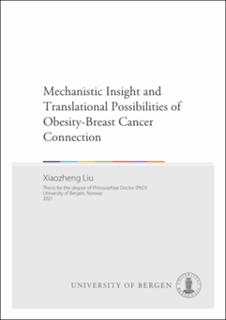| dc.contributor.author | Liu, Xiaozheng | |
| dc.date.accessioned | 2022-02-10T07:41:35Z | |
| dc.date.available | 2022-02-10T07:41:35Z | |
| dc.date.issued | 2021-12-07 | |
| dc.date.submitted | 2021-11-05T11:23:34.482Z | |
| dc.identifier | container/e1/70/f7/14/e170f714-2e6d-4a0a-bfb3-286af47d08e1 | |
| dc.identifier.isbn | 9788230857724 | |
| dc.identifier.isbn | 9788230854686 | |
| dc.identifier.uri | https://hdl.handle.net/11250/2978114 | |
| dc.description.abstract | Obesity is an independent risk factor for more than thirteen cancer types. In breast cancer context, obesity is strongly associated with higher incidence and poorer prognosis in postmenopausal patients. The management of breast cancer in obese patients is faced with numerous challenges, as dosing, toxicity and drug efficacy. Thus, it is highly demanded to investigate the in-depth mechanisms underlying the obesity-cancer connection and translate these fundamental mechanisms into clinical applications.
To this end, we first searched for breast cancer phenotypes driven by the obese environment. In both patients and preclinical models, we identified enhanced stem-like traits in cancer cells exposed to the obese settings and it independently predicted breast cancer risks. Next, as obesity-induced elevated free fatty acid is a central phenotype in obese individuals, we established in vitro cancer cell models by long-term exposure to palmitic acid. Under this condition, cancer cells consistently dedifferentiated towards a cancer stem-like phenotype and displayed enhanced tumor initiation capacity. Mechanistically, we found that the obesity-induced phenotype was governed epigenetically through remodeling the chromatin landscape in cancer cells, specifically through increased chromatin occupancy of the transcription factor CCAAT/enhancer-binding protein beta (C/EBPB). We further identified Lipocalin 2 and Claudin 1 as the key downstream target genes of C/EBPB and functionally demonstrated the critical roles of C/EBPB and its targets in obesity-induced breast cancer initiation phenotypes.
The second part of this thesis focuses on the investigation of endotrophin-induced physiological responses in human cells and the clinical translational potential. The cleavage product of collagen VI alpha 3 chain, endotrophin, is upregulated in obese states and has been previously reported as a stimulator for oncogenic transformation of mammary ductal epithelial cells in rodents. In addition, endotrophin presents pro-fibrotic, chemoattractant, pro-angiogenic and epithelial to mesenchymal transition induction properties in murine cells. Here, we demonstrated that the circulating levels of endotrophin is increased in breast cancer patients compared with healthy individuals. Recombinant human endotrophin exerted similar effects on human cell lines as in murine cells, suggesting that endotrophin is a viable target for breast cancer therapy. As such, we developed neutralizing antibodies targeting human endotrophin, and ultimately validated the effectiveness of such antibody in human breast cancer cell lines and human cell line-derived nude mouse models. In both in vitro and in vivo models, the antibody showed potent tumor growth inhibition and anti-cisplatin resistance functions, and thus provided the important stage towards developing targeted therapies for obese breast cancer patients. | en_US |
| dc.language.iso | eng | en_US |
| dc.publisher | The University of Bergen | en_US |
| dc.relation.haspart | Paper I: Liu, X. Z., Rulina, A., Choi, M. H., Pedersen, L., Lepland, J., Takle, S. T., ... & Halberg, N. (2022). C/EBPB-dependent adaptation to palmitic acid promotes tumor formation in hormone receptor negative breast cancer. Nature communications, 13, 69. The article is available at: <a href="https://hdl.handle.net/11250/2977797" target="blank">https://hdl.handle.net/11250/2977797</a> | en_US |
| dc.relation.haspart | Paper II: Bu, D., Crewe, C., Kusminski, C. M., Gordillo, R., Ghaben, A. L., Kim, M., ... & Scherer, P. E. (2019). Human endotrophin as a driver of malignant tumor growth. JCI insight, 4(9), e125094. The article is not available in BORA due to publisher restrictions. The published version is available at: <a href="https://doi.org/10.1172/jci.insight.125094" target="blank">https://doi.org/10.1172/jci.insight.125094</a> | en_US |
| dc.rights | Copyright the Author. All rights reserved | |
| dc.title | Mechanistic Insight and Translational Possibilities of Obesity-Breast Cancer Connection | en_US |
| dc.type | Doctoral thesis | en_US |
| dc.date.updated | 2021-11-05T11:23:34.482Z | |
| dc.rights.holder | Copyright the Author. | en_US |
| dc.description.degree | Doktorgradsavhandling | |
| fs.unitcode | 13-14-0 | |
